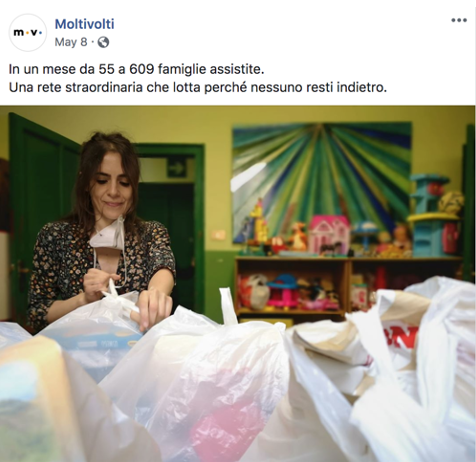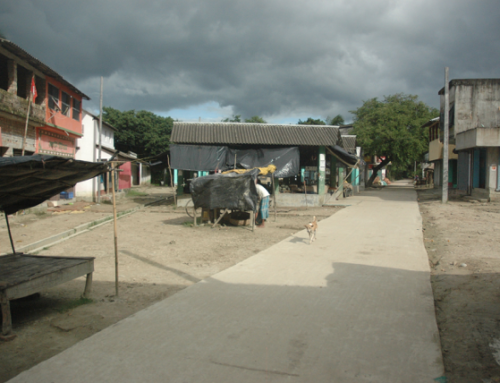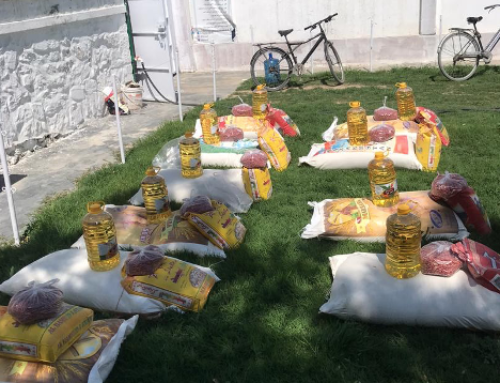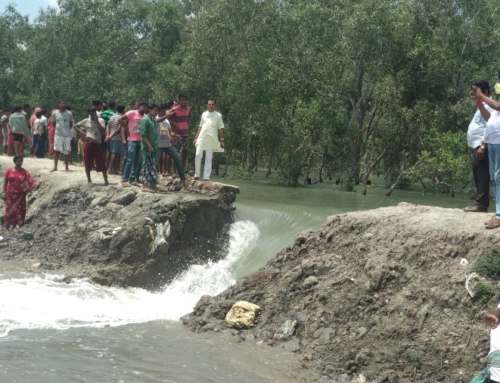In the European context, “crisis” discourse – i.e., references to “migrant crisis” (De Genova 2018; Dines, Montagna, and Vacchelli 2018), “economic crisis” (Navarro 2013; Karanikolos et al. 2013) and most recently the “public health crisis” created by Covid-19 – often reveal racialized and class-motivated anxieties about who belongs and is deserving of social benefits. At the same time, “crisis” discourse may obscure the economic interests in surplus populations whose labor is highly exploited and absolve responsibility from the political and economic elites positioned to benefit from any so-called crisis (Álvarez-Velasco, De Genova, Fontanari, et al. 2016; Basu, Carney, and Kenworthy 2017; Narotzky 2013). This discourse also rarely accounts for the ways in which local communities actually experience and imagine the intersecting and variegated states of struggle that get sensationalized as “crises.”
Migration into Southern Europe from neighboring regions, but most notably North Africa, Eastern Europe, and the Middle East, has been repeatedly framed as a “crisis” and a “question” whose ebb and flow spans the past two decades (De Genova 2016, 2017, 2018). In seeking to arrive to Europe, migrants have fled from highly disruptive, violent, and untenable circumstances – also often referenced as by their European counterparts as “crises” – such as civil war, chronic hunger and food insecurity, and violent social unrest. Migration across the Central Mediterranean has been characterized both by the daily arrival of migrants to Southern European shores, most prominently the islands of Sicily and Lampedusa, and by the widespread death of migrants at sea. Between 2014 and 2019, more than 659,500 migrants arrived to Italy vis-à-vis the Central Mediterranean route, while more than 15,000 were reported dead or missing (UNHCR 2020). Even though Southern European ports were declared as “unsafe,” and most search-and-rescue efforts were halted at the start of the pandemic, there have already been more than 60,000 migrant arrivals to Southern Europe and 700 deaths recorded this year (IOM 2020). In short, migration across the Central Mediterranean has continued as people now also flee poor responses to the pandemic in their countries of origin (Sanchez and Achilli 2020). While humanitarian search-and-rescue efforts have resumed in recent months, European governments have pushed forward with criminalizing the organizations behind such efforts by seizing boats and issuing exorbitant fines.
In Sicily, the highly contested phenomenon of unseaworthy boats transporting migrants from Africa and the Middle East has intersected with economic crises, austerity politics, the rise of far-right populism, and most recently, the Covid-19 pandemic. Early in the pandemic, Sicily reported significantly fewer Covid-related infections and deaths compared to the rest of Italy and to northern Italian regions in particular, but recent months have revealed a shift in trends. Efforts by the regional government and the healthcare system to contain the spread of the virus and care for infected patients have been notably less robust than in Northern and Central Italy. Disparities in the capacity of regional governments and their healthcare sector to respond to the pandemic may be explained in part by the uneven enforcement of austerity measures that were introduced following Italy’s sovereign debt crisis in 2008, with effects disproportionately felt in Sicily and other regions that were already in a less favorable economic position (Carney 2017; Carney and Ostrach 2020; Knight and Stewart 2016; Muehlebach 2016). The public health emergency created by Covid-19 has intensified the lingering effects of these austerity measures while also amplifying all-too-familiar anxieties linked to poverty and organized crime.
A Plagued Economy, Corrupt Interests, and Migrant Exploitation
The pandemic has delivered an economic crisis of profound proportions in Sicily. As one of the most economically disadvantaged regions of Italy, many of the island’s inhabitants rely on informal labor – notably through tourism – and were subsequently excluded from government-sponsored financial relief. The sudden drop in tourists to the island beginning in mid-March, followed by a very slow summer, forced the closure of many local businesses, including hotels, restaurants, and shops. Such closures have stoked credible fears of a renewed mafia presence, as mafiosi prey on the desperation of locals who are struggling to feed their families, keep their businesses afloat, or pay their bills (D’Ignoti 2020; La Barbera 2020). In a recent interview, Italy’s interior minister Luciana Lamorgese warned “The eyes of the Mafiosi are focused on the huge amount of funding introduced by the government and soon also by the EU. Organized crime groups are trying to get their hands on businesses and entire production chains and this is shown by the growth of anti-mafia interdictions” (ANSA 2020a).1 In Sicily, Palermo’s Mayor Leoluca Orlando, a long-time defender of the anti-mafia movement and a widely recognized advocate for migration, quipped “[Mafiosi are ready] to exploit the desperation of the new poor from coronavirus.” In recent years, local anti-mafia efforts focused on preventing interference by organized crime in local commerce, elections, and everyday social relations have closely intersected with pro-migrant initiatives while recognizing how unauthorized migrants – locally referred to as irregolari – are vulnerable to exploitation by mafiosi.
Consistent with nativist discourse that attributes infection and disease to so-called migrant invasions, the Covid-19 pandemic has reinvigorated the routine scapegoating of migrants as vectors of virus transmission. As of late August and amid a spike in local Covid-19 cases that had likely been introduced by tourists, Sicily’s governor resorted to draconian measures by ordering the immediate closure of all migrant reception centers and the transfer of migrants to elsewhere in Italy or to quarantine on cruise ships docked at one of the island’s ports. Those who failed to comply would face arrest (Rosen 2020). Most recently, far-right leaders in Lampedusa and Sicily cited Covid-19 risks and the resulting “humanitarian and health crisis” as reasons to close migrant centers and to turn away search-and-rescue boats transporting migrants in distress (France 24 News Wires 2020).
While migrants are neither at fault for introducing the novel coronavirus to Southern Europe nor for its rapid spread, migrants are placed at greater structural risk for contracting it (Camilli 2020). Many migrants are exposed on the frontlines as “essential workers” in health care, elder care, childcare, and food service. With extremely limited economic resources, they reside in crowded apartments or makeshift camps that lack access to potable water and food, and have irregular access to the health system even when they are officially entitled to coverage, or face discrimination, exclusion, and delays in accessing care (Carney 2017; Carney and Krause 2020). Such extant vulnerabilities have been exacerbated by the pandemic, as migrants are also being exploited in the sectors deemed “essential” for ensuring the care and social reproduction of Sicilian and Italian society. With Southern European agricultural sectors heavily reliant on migrant labor constrained by Covid-19 related EU border closures, the Italian government prepared legislation to authorize short-term agricultural work by migrants as produce ripened at the beginning of summer and again this fall (ANSA 2020b; Purdy 2020). Italy’s national government is now providing amnesty for some migrant workers, but many are still excluded based on the sectors in which they work; these protections are only temporary and will not necessarily improve migrants’ access to health care (Open Society 2020). Importantly, austerity disproportionately reduced migrants’ access to Italy’s healthcare system while also weakening the safety net and stoking anti-immigrant sentiment (Carney 2017; Carney and Ostrach 2020). Nevertheless, far-right political parties insist that migrants have drained Italy of public resources as they also extend their narrative of blame for the social and economic fallout of austerity on the “migrant crisis” (Carney, forthcoming).
Refusing Responsibility, Embracing Solidarity
Despite these conditions, many ordinary citizens and noncitizens in Sicily still refuse to label each other as “crises” by engaging in radical forms of collective care (Carney, forthcoming). In addition to more recent grassroots initiatives around food sharing and resource pooling that have emerged during Covid-19, cooperatives situated within various municipalities across the island engage the principles of solidarity economies and facilitate practices of mutual aid among local residents by prioritizing collective ownership and strong social ties over the economic bottom line. Meanwhile, grassroots coalitions such as the Palermo-based Zabbara and the group Arte Migrante create space for arts- and media-based political activism around calls for recognizing human rights in the Mediterranean.

A volunteer packs donations for distribution. (Italy)
While embracing their island’s heritage and identity, few of Sicily’s citizen and noncitizen inhabitants subscribe to an island mentality of being disconnected from broader political, economic, social, and environmental contexts. Many siciliani feel marooned by the rest of Italy and the EU, particularly amid Italian and European responses – or lack thereof – to migration in the Central Mediterranean wherein the day-to-day aspects of migrant reception are framed as the “responsibility” of Sicily and other frontline territories. Even so, they situate their struggles within myriad spatial and temporal connections beyond the island. These connections trace to the Americas, particularly the USA, to North Africa, and to the many different groups that arrived to and inhabited this place at the heart of the Mediterranean over the span of multiple centuries. Just as local, established practices of mutual aid and social solidarity disallow for an individualized sort of prosperity, they also eschew an individualized, disconnected rendering of calamity and crisis. As such, no crisis is an island; it is always already intersecting with both named and unnamed physical and metaphysical dynamics, some preceding, others anticipated.
An alarm is being sounded that Covid-19 is providing an opportunity and excuse for Southern European governments to further restrict entry to refugees and asylum-seekers, framing a “new European refugee crisis” (Khan 2020). In addition, while sizeable pandemic recovery packages are disbursed to European citizens, there are genuine concerns about how the economic fallout of the pandemic will provoke future waves of austerity. Yet policymakers must realize and responsibly attend to the needs of those who are globally displaced and of Europe’s most politically, socially, and economically marginalized, whose ongoing struggles have been compounded by the novel coronavirus. In Sicily, as elsewhere in Europe, the pandemic is mapping onto these preexisting conditions while also serving as a prism to demystify the underlying causes of, and necessary collective responses to, widespread injustice.
Notes:
[1] As administrative blocks whose function is to prevent interference by mafiosi in government or the private sector, interdictions “block activities by businesses who are suspected of having been infiltrated by organized crime groups. From August 2019 to July 2020, some 1,865 interdictions were issued compared with 1,491 during the same period of the previous year” (ANSA 2020a).
References:
ANSA. 2020a. “Italy’s interior minister urges citizenship reform.” Accessed [October 15, 2020]. https://www.infomigrants.net/en/post/27913/italy-s-interior-minister-urges-citizenship-reform
ANSA. 2020b. “Italy ‘to allow 18,000 non-EU seasonal farmhands in’.” Accessed [October 15, 2020]. https://www.infomigrants.net/en/post/27914/italy-to-allow-18-000-non-eu-seasonal-farmhands-in
Álvarez-Velasco, Soledad, Nicholas De Genova, Elena Fontanari, et al. 2016. “Europe / Crisis: New Keywords of ‘the Crisis’ in and of ‘Europe’.”
New Keywords Collective, Eds. De Genova N., Tazzioli M. Near Futures Online 1 “Europe at a Crossroads.” Accessed [August 11, 2016]. http://nearfuturesonline.org/europecrisis-new-keywords-of-crisis-in-and-of-europe/
Basu, Sanjay, Megan A. Carney, and Nora Kenworthy. 2017. “Ten years after the financial crisis: The long reach of austerity and its global impacts on health.” Social Science and Medicine 187: 203-207.
Camilli, Annalisa. 2020. “Qual è stato l’impatto della pandemia sui migrant.” Internationale. Accessed [11 November 2020]. https://www.internazionale.it/notizie/annalisa-camilli/2020/10/26/pandemia-migranti
Carney, Megan A. 2017. “‘Sharing One’s Destiny’: Effects of austerity on migrant health provisioning in the Mediterranean Borderlands.” Social Science and Medicine 187: 251-258.
Carney, Megan A. Forthcoming. Island of Hope: Migration and Solidarity in the Mediterranean. Berkeley and Los Angeles: University of California Press.
Carney, Megan A. and Krause, Keegan. 2020. “Immigration/Migration and Healthy Publics: The Threat of Food Insecurity.” Palgrave Communications 6(93).
Carney, Megan A. and Ostrach, Bayla. 2020. “Austerity, Not COVID-19, Strains National Healthcare Systems.” Somatosphere. Accessed [June 8, 2020]. http://somatosphere.net/2020/austerity.html/
De Genova, Nicholas. 2018. “The ‘Migrant Crisis’ as Racial Crisis: Do Black Lives Matter in Europe?” Ethnic and Racial Studies 41(10).
De Genova, Nicholas. 2017. “Introduction: The Borders of ‘Europe’ and the European Question.” In The Borders of “Europe”: Autonomy of Migration, Tactics of Bordering, De Genova, Nicholas (ed.), 1-35. Durham: Duke University Press.
De Genova, Nicholas. 2016. “The European Question: Migration, Race, and Postcoloniality in ‘Europe’.” Social Text 34(3).
D’Ignoti, Stefania. 2020. “Mafia, Poverty, and the Pandemic.” Foreign Policy. Accessed [October 15, 2020.] https://foreignpolicy.com/2020/05/04/coronavirus-pandemic-southern-italy-mafia-poverty/
Knight, Daniel M. and Charles Stewart. 2016. “Ethnographies of Austerity: Temporality, Crisis, and Affect in Southern Europe.” History and Anthropology 27 (1): 1-18.
IOM. 2020. “Missing Migrants: Tracking Deaths Along Migratory Routes.” Accessed [October 15, 2020]. https://missingmigrants.iom.int/region/mediterranean
La Barbera, Noemi. 2020. “A Palermo con chi aiuta i più poveri durante la pandemia.” Internazionale. Accessed [October 15, 2020]. https://www.internazionale.it/video/2020/05/20/sicilia
Muehlebach, Andrea. 2016. “Anthropologies of Austerity.” History and Anthropology 27 (3): 359-372.
Narotzky, Susana. 2013. “The Anthropology of Economic Processes in a Europe in Crisis.” Council for European Studies, Perspectives on Europe 43(1): 22-26.
Open Society. 2020. “Q&A: Progress for Migrant Workers in Italy.” Accessed [June 4, 2020]. https://www.opensocietyfoundations.org/voices/q-and-a-progress-for-migrant-workers-in-italy
Purdy, Chase. 2020. “Covid-19 Exposes a Fragile Food System, and the Power of Immigrants.” Quartz, April 26. Accessed [October 28, 2020]. https://qz.com/1844194/covid-19-exposes-how-the-global-food-system-relies-on-immigrants/
Rosen, Kenneth. 2020. “Sicily Gives 24-Hour Notice to Migrants, NGOs to Leave or Risk Arrest Over COVID-19.” Newsweek. Accessed [October 28, 2020]. https://www.newsweek.com/sicily-migrants-coronavirus-1526987
Sanchez, G. and Achilli, L. 2020. “Stranded: the impacts of COVID-19 on irregular migration and migrant smuggling.” Policy Briefs. Migration Policy Centre. Accessed [October 22, 2020]. https://cadmus.eui.eu//handle/1814/67069
UNHCR. 2020. “Mediterranean Situation: Italy.” Operational Data Portal of UNHCR. Accessed [October 23, 2020]. https://data2.unhcr.org/en/situations/mediterranean/location/5205
Cite As: Carney, A. Megan. 2020. “No Crisis Is An Island: On Migration, Pandemic, and Everyday Struggles in Sicily.” In “Intersecting Crises,” Calynn Dowler, editor, American Ethnologist website, 12 November 2020, [https://americanethnologist.org/features/pandemic-diaries/introduction-intersecting-crises/no-crisis-is-an-island-on-migration-pandemic-and-everyday-struggles-in-sicily]
Megan A. Carney is a sociocultural and medical anthropologist at the University of Arizona. She is the author of two books, The Unending Hunger: Tracing Women and Food Insecurity Across Borders (2015) and Island of Hope: Migration and Solidarity in the Mediterranean (forthcoming).




